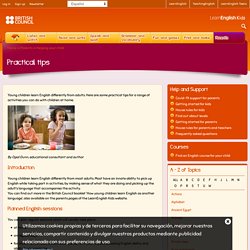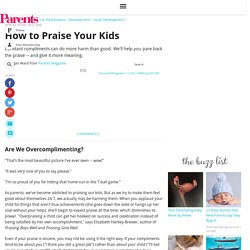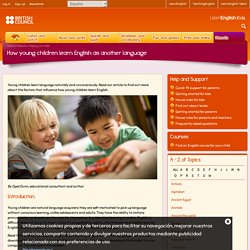

Psicóloga Organizacional
Practical tips. By Opal Dunn, educational consultant and author Introduction Young children learn English differently from most adults.

Most have an innate ability to pick up English while taking part in activities, by making sense of what they are doing and picking up the adult’s language that accompanies the activity. You can find out more in the British Council booklet ‘How young children learn English as another language’, also available on the parents pages of the LearnEnglish Kids website. Planned English sessions You can plan regular sessions which will usually take place: at home on regular days for about ten to twenty minutes adjusted to fit your child’s increasing English ability and ability to concentrate as a planned programme that reviews and builds on known activities and introduces new ones. Short English sessions These are more informal and can take place: any place – in the car, at bathtime, in a supermarket queue any time in response to a mood or special experience.
Basic programme Crafts. How to Praise Your Kids. Are We Overcomplimenting?

"That's the most beautiful picture I've ever seen -- wow! " "It was very nice of you to say please. " "I'm so proud of you for hitting that home run in the T-ball game. " As parents, we've become addicted to praising our kids. But as we try to make them feel good about themselves 24-7, we actually may be harming them. Even if your praise is sincere, you may not be using it the right way. But that doesn't mean you should drop praise from your disciplinary playbook.
The 10 Best Ways to Praise Don't overdo it. Rephrase Your Praise Toddlers Instead of saying: "You were a good boy. " Say: "You shared nicely with your friend. " Preschoolers. Ten ways to support your child’s English-learning at home. As the British Council opens a new Learning Time with Shaun & Timmy centre in Mexico for two- to six-year-olds, senior teacher Sarah Reid offers some useful tips for supporting your child’s learning at home. More and more parents want their children to learn English from a young age. I often meet parents of children as young as two or three who say that proficiency in speaking English will help their child 'get ahead in a globalised world'.
In other words, the sooner their children get started, the better. The single most important factor in a child’s success with English is their parents' interest and encouragement, no matter what their child’s age. So what can parents do at home to support their learning? 1. To build a positive attitude towards learning, and towards English as a language, the best place to start is with yourself. 2. Children will naturally learn everything around them without any adult intervention. 3. 4. 5. You can easily replicate activities like this at home. 6. 7.
LearnEnglish Kids. Play based learning statement EN. ThePowerofPlay. Learning through play ey. ZERO TO THREE. Play ENG. Play in children s development health and well being feb 2012. Teachers TV- How Do They Do It In Sweden? Patricia Kuhl: The linguistic genius of babies.
Alison Gopnik: What do babies think? Early Childhood Care and Education. Early childhood, defined as the period from birth to eight years old, is a time of remarkable growth with brain development at its peak.

During this stage, children are highly influenced by the environment and the people that surround them. Early childhood care and education (ECCE) is more than preparation for primary school. It aims at the holistic development of a child’s social, emotional, cognitive and physical needs in order to build a solid and broad foundation for lifelong learning and wellbeing. ECCE has the possibility to nurture caring, capable and responsible future citizens. In this way ECCE is one of the best investments a country can make to promote human resource development, gender equality and social cohesion, and to reduce the costs for later remedial programmes. How young children learn English as another language. By Opal Dunn, educational consultant and author Introduction Young children are natural language acquirers; they are self-motivated to pick up language without conscious learning, unlike adolescents and adults.

They have the ability to imitate pronunciation and work out the rules for themselves. Any idea that learning to talk in English is difficult does not occur to them unless it’s suggested by adults, who themselves probably learned English academically at a later age through grammar-based text books. Read the notes below about young children learning English as another language. The advantages of beginning early Young children are still using their individual, innate language-learning strategies to acquire their home language and soon find they can also use these strategies to pick up English.
Stages in picking up English Spoken language comes naturally before reading and writing. Understanding Frustration Mistakes Gender differences. The Woman Who Changed Her Brain: Barbara Arrowsmith-Young at TEDxToronto.